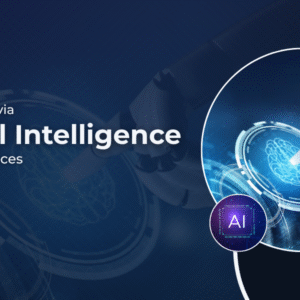The healthcare industry today is under constant pressure to deliver high-quality care while managing increasing operational challenges. With rising patient numbers, complex compliance regulations, and the need for better coordination between departments, hospitals and clinics are turning to digital solutions to simplify operations. One of the most effective ways to achieve this is through healthcare software development services.
Healthcare software development services provide custom-made digital tools designed to solve real-world problems in clinics, hospitals, and healthcare systems. These solutions help organizations streamline their processes, reduce manual workload, improve communication, and ultimately enhance patient care while lowering operational costs. In this blog, we’ll explore how healthcare software development services directly improve operational efficiency and why they are an essential investment for modern healthcare facilities.
Understanding Healthcare Software Development Services
What Are Healthcare Software Development Services?
These services include the creation, integration, and maintenance of custom software solutions specifically for the healthcare sector. Examples of such software include electronic health records (EHR), hospital management systems (HMS), patient portals, telemedicine platforms, appointment scheduling tools, billing software, and more.
Healthcare software is not one-size-fits-all. Each solution is developed after understanding the specific needs of a healthcare provider. Development companies work closely with healthcare organizations to create systems that fit into their workflows and enhance overall performance.
Why Operational Efficiency Matters in Healthcare
Operational efficiency means running the day-to-day tasks of a hospital or clinic in a smooth, timely, and cost-effective manner. This includes everything from managing patient records and scheduling appointments to handling billing and maintaining equipment. When operations run efficiently, healthcare professionals can focus more on patient care rather than paperwork or system delays.
Automating Routine Administrative Tasks
Streamlining Appointment Scheduling
Manually booking appointments can lead to errors like double-booking or long patient wait times. A custom appointment scheduling system automates the entire process, showing available time slots, managing doctor availability, and sending automatic reminders to patients. This not only saves time for administrative staff but also improves patient satisfaction.
Digitizing Patient Records with EHR Systems
Electronic Health Record (EHR) systems are one of the core components of modern healthcare software. They eliminate the need for paper files and allow healthcare professionals to access patient history, lab results, and treatment plans instantly. By reducing time spent searching for information, EHR systems speed up the consultation process and minimize medical errors.
Automating Billing and Insurance Claims
Manual billing processes are time-consuming and prone to mistakes. Healthcare software can automate billing, generate accurate invoices, and even handle insurance claims submissions. This ensures faster processing and fewer claim rejections. It also reduces the administrative burden on the staff, allowing them to focus on other important tasks.
Enhancing Communication and Collaboration
Improving Internal Coordination
In large hospitals, departments like radiology, pharmacy, and laboratories need to share data regularly. Healthcare software enables seamless data exchange between departments. For instance, once lab results are ready, they can be automatically updated in the patient’s record and made available to the treating physician without any delay.
Facilitating Doctor-Patient Communication
Patient portals and messaging systems allow patients to ask questions, request prescription refills, or view test results without calling the clinic. Doctors can respond more efficiently, and unnecessary in-person visits can be reduced. This improves workflow and ensures faster response times.
Reducing Human Errors and Enhancing Accuracy
Using Software for Accurate Data Entry
Manual data entry is not only slow but also leads to errors, which can have serious consequences in healthcare. Custom software includes features like drop-down menus, validation rules, and auto-fill suggestions that reduce the chances of mistakes. This leads to more accurate patient records, lab reports, and prescriptions.
Medication Management Systems
Software tools can alert doctors and nurses about potential drug interactions, allergies, or incorrect dosages. This helps avoid medical errors and ensures patients receive safe and effective treatment.
Supporting Better Resource Management
Equipment and Asset Tracking
Hospitals have a wide range of equipment that needs to be monitored, from diagnostic tools to life-saving machines. Healthcare software can track the usage, maintenance schedule, and availability of equipment in real time. This reduces downtime and ensures that critical devices are always ready for use.
Managing Staff Schedules
Manually preparing staff duty rosters can be complicated, especially in 24/7 facilities. Software solutions can automate shift scheduling, prevent overlaps, and manage leaves more efficiently. This ensures proper staffing at all times and improves the overall workflow.
Simplifying Compliance and Reporting
Keeping Up with Regulations
Healthcare providers are expected to comply with numerous regulations, such as HIPAA, GDPR, and local data protection laws. Custom healthcare software can be developed with compliance features built in, such as role-based access, audit logs, and secure data storage. This reduces the risk of legal issues and data breaches.
Generating Reports Automatically
Whether it’s patient outcomes, billing records, or staff performance, healthcare software can automatically generate reports that help administrators make informed decisions. These reports also simplify compliance audits and save hours of manual reporting work.
Enabling Telemedicine and Remote Monitoring
Expanding Access to Care
With the rise of telehealth, software platforms now allow patients to consult with doctors via video calls. This is especially useful in rural or underserved areas. It also reduces the load on physical infrastructure, helping hospitals serve more patients without overcrowding.
Monitoring Patients at Home
Remote monitoring systems can track patients’ vitals and health status from home using wearable devices. Healthcare providers can then use the data to adjust treatments or intervene early if issues arise. This reduces hospital readmissions and supports continuous patient care with fewer resources.
Improving Decision Making with Data Analytics
Real-Time Dashboards for Administrators
Healthcare administrators need access to real-time data to make operational decisions. Custom dashboards can display live metrics like bed availability, patient inflow, discharge rates, and financial performance. Having this data in one place helps managers allocate resources more efficiently.
Predictive Analytics
Software with predictive analytics can identify trends and forecast future demands, such as patient admission rates during flu season. This allows hospitals to prepare in advance and avoid overburdening staff or equipment.
Cost Reduction and Long-Term Savings
Lowering Operational Costs
By automating repetitive tasks and improving accuracy, healthcare software significantly reduces operational costs. Fewer errors mean fewer costly fixes. Faster billing means improved cash flow. Efficient scheduling reduces idle time for both staff and equipment.
Increasing Productivity
With less time spent on paperwork and more efficient communication, doctors and nurses can focus on what truly matters—caring for patients. Productivity increases across all departments when systems are well-integrated and easy to use.
Custom Solutions for Unique Challenges
Addressing Specific Pain Points
Every healthcare organization has its own set of challenges. Some may struggle with patient flow, while others need better billing solutions. A healthcare software development service assesses these issues and builds customized tools to resolve them, ensuring that the solution is a perfect fit.
Ensuring Scalability
As hospitals grow or adopt new services, their software must adapt too. Scalable solutions developed through healthcare software services can be expanded or modified easily, without the need to rebuild the entire system.
Conclusion
Healthcare software development services are more than just a technological upgrade—they are a strategic move toward a more efficient, accurate, and responsive healthcare system. By automating administrative tasks, improving communication, reducing errors, and optimizing resources, these services allow healthcare providers to operate at their best. The result is not just lower operational costs but also better patient outcomes and a more satisfied workforce.
Healthcare providers looking to streamline their operations and improve service delivery should consider partnering with experts who understand the intersection of healthcare and technology. An on demand app development company can help design and build tailored software solutions that are secure, scalable, and aligned with organizational goals. Investing in such services today sets the foundation for long-term efficiency and success in a rapidly evolving healthcare landscape.
FAQs
How does healthcare software reduce the administrative workload?
It automates tasks like appointment scheduling, billing, and data entry, which frees up time for staff to focus on patient care.
Can healthcare software improve staff communication?
Yes, it allows seamless data sharing between departments and secure messaging between staff and patients, improving coordination.
Is custom software better than off-the-shelf healthcare systems?
Custom software is tailored to an organization’s specific needs, making it more efficient and user-friendly compared to generic solutions.
What areas of a hospital benefit most from software integration?
Departments like administration, billing, radiology, pharmacy, and patient services all benefit from well-integrated software systems.
Does software help with patient data accuracy?
Yes, software reduces manual errors by validating data and automating entry, ensuring more accurate and up-to-date patient records.








